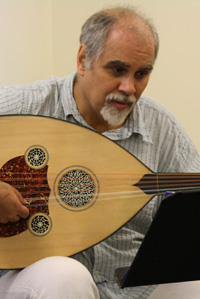"I have long had an interest in Central Asia. In Portland, Maine, where I was working as a musician during the eighties, there were a lot of Iranian and Afghan refugees. I taught myself enough Persian to volunteer in refugee resettlement. Later, as I was finishing my master's in jazz guitar, I was short on gigs one summer, and applied for a government fellowship to study Uzbek language. I got it. One thing leads to another—I went for a doctorate in ethnomusicology. So that's how I ended up putting my interest in music together with an interest in Central Asia."
"We perceive the world in ways that we just take for granted, that are transmitted to us by our surroundings. Different things are important to different people. When I lived in Uzbekistan (in the mid-'90s—a pretty crazy time), all of the things that I used to worry about, no one even cared about them. They didn't even have words for them. On one level you get a sense of common humanity, but you also see that, to really understand other people, you have to do a ton of work to meet them on their own terms."
"In my Harmony classes I want to make sure my students master the grammar and vocabulary of the musical system they're in, but also they should realize that this system is just one of many. With all the world music we offer at Berklee, we give students a little of the experience of, 'Toto, we're not in Kansas anymore,' in that the conventions and systems of thought behind a lot of musical systems are so different. I find it liberating—and I think a lot of students find that also—to imagine music that doesn't have chords or bar lines. And to find that they like it expands people's musical capabilities and, on some level, their cultural and personal vision of the world."
"One thing that comes up a lot in my teaching is that the process of learning to make music is counterintuitive. Careful practice organizes your nervous system in a way that allows you to communicate with your instrument, so the more discipline you use in preparation, the more expressive you will sound. If you want to play fast, practice really slowly. Virtuosos tend to spend much of their practice time on the rudiments; a lot of things have to be internalized over a long period of time."
"It's important to train intuitively and intellectually at the same time. Very little sophisticated music exists without a good shot of both. Music is emotionally coded language, and our job as musicians is to understand how this language works and how we can develop it and participate in it. We also need to understand that our audiences basically come to us so that they can leave feeling better than when they walked in."

